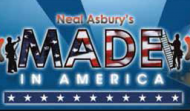
Host Neal Asbury opened his nationally syndicated “Neal Asbury’s Made in America” show on Radio America (now on 70 stations) with the disquieting news that while 22 million workers are employed by the government, only 12 million are employed in manufacturing – the historical foundation of America’s workforce.
“This is not sustainable. Manufacturing jobs are good paying jobs, but we’ve resorted to creating a nation of low paying hamburger flippers; jobs that were never intended to support a family. The result is that there are 45 million Americans on food stamps –the fiftieth straight month of growing government handouts. This is not the way to grow America,” proposed Neal.
The first guest on Made in America was Vance Ginn, Ph.D., an Economist in the Center for Fiscal Policy at the Texas Public Policy Foundation in Austin, TX, one of the top free market, state-level think tanks in the nation.
“America has been held back in the global energy marketplace since 1973 when a ban was instituted for exporting domestic oil. But now that we have a glut of oil, it doesn’t make sense anymore. Limiting oil production jobs in the American oil and gas sector is limiting what could be millions of good paying jobs,” noted Ginn.
Neal agreed, noting that if we could export oil, our allies would be less dependent on unfriendly foreign governments. This administration is all about ideology allowing a small group of environmentalists to dictate our energy policy.
“The trend is moving in Congress to allow for oil exports but Obama has threatened to veto any export legislation, even though studies show that it will not cause gas prices at the pump to rise. We need to export oil to make our country more successful,” according to Ginn
The next guest on Made in America was Fred Smith from the Center for Advancing Capitalism for the Competitive Enterprise Institute, who characterized American business as a “sleeping giant.”
“Government intervention in the economy—via spending, regulation, and taxation—has expanded steadily over the last century and is now at an all-time high. Yet business has generally done little to resist that growth, viewing the costs of navigating a complex and ever-changing regulatory maze as an external factor beyond their control. Yet, not all businesses have been so passive, suggesting that resistance to regulatory overreach is possible. But the history of such resistance is both thin and demonstrates that future efforts will require learning from this history and considering what changes are needed to succeed,” according to Smith.
Smith pointed to agricultural subsidies as an example of a government policy that hurts American business and global competition.
Stephen Moore chief economist of the Heritage Foundation, returned to Made in America, to report that Obamanomics has been a disaster, resulting in 56 million American women out of the workforce, and 94 million Americans of both sexes out of the workforce–a 38-year high.
“What’s worse is that there are 20 million college grads living at home. It speaks to Obama’s policies not creating good paying jobs. Kids are taking courses that don’t build the skills they need for good jobs, like those in manufacturing or in the trades,” according to Moore.
Neal agreed and pointed to the number of technical and vocational schools that are folding.
“The irony of Obamanomics is that the constituents that helped him get elected are the very ones that are losing in the jobs market: blacks, Hispanics, people under 25 and single women. Meanwhile, Obama fails to support the energy sector where good paying jobs could be created,” maintained Moore.
The final guest on Made in America was John Manzella, a frequent guest, and a world-recognized speaker and author of the newly released book, “Global America: Understanding Global and Economic Trends and How to Ensure Competitiveness.” In addition, he is editor-in-chief of the ManzellaReport.com, the premier source for global business and economic news and analysis, and president of Manzella Trade Communications, a strategic communications, publishing and consulting firm.
“There are dozens of trends bombarding America that have kept it from building its global leadership, especially as it applies to American exporting. We have the manufacturing bases but we need to keep up with automation, which reduces labor costs, making us more competitive to China and its lower worker wages,” according to Manzella.
He also pointed to healthcare costs which many CEOs take into account when considering adding to their labor force. They try to stay under the 50 employee
threshold to reduce healthcare costs.
“We’re really missing out on the opportunities of the TransPacific Partnership which includes 11 Asian countries and account for 1/3 of all trade. But intellectual property and agricultural subsidies threaten to derail the negotiating. But I don’t see this getting ratified before Obama leaves office,” concluded Manzella.
Wrapping up the show, co-host Dr. Rich Roffman continued his exploration of the impact robots are having on the labor force. The newest use is having robots at the Japanese Hitachi factory actually bossing around human workers. The robot, called AL, will evaluate workers and be able to make decisions on the fly.
On the cronyism front, Dr. Roffman noted that Secretary of State John Kerry appointed a “transparency coordinator” to streamline the State Department’s much-criticized response to records requests from the public and Congress. Kerry named retired Ambassador Janice Jacobs to the post to improve the preservation and release times of documents requested by Congress and the public under the Freedom of Information Act.
“Maybe Kerry should have done a little better job vetting Ms. Jacobs since she is a big Hillary Clinton supporter, something that wasn’t transparent when he made the announcement of her appointment,” proposed Dr. Roffman.
Dr. Roffman concluded his report with the news that Bill Clinton spent $176 million on his library and George Bush spent $300 million on his, Barack Obama ‘s proposed library is carrying a price tag of $1 billion.
“That’s a lot of books,” noted Dr. Roffman.
Each week Neal Asbury’ Made in America provides Neal’s insights into the week’s top news stories and their impact on the worlds of entrepreneurship, small business ownership and the overall economy. Neal’s analysis, together with co-host Dr. Richard Roffman, a veteran 30-year publisher with extensive domestic and international experience, takes a non-biased approach based on real life experience in business as an American manufacturer and exporter. Made in America airs nationally each Saturday from 7-8:00 PM on Radio America. Link to Made in America at http://www.nealasburysmadeinamerica.com.
SEP



